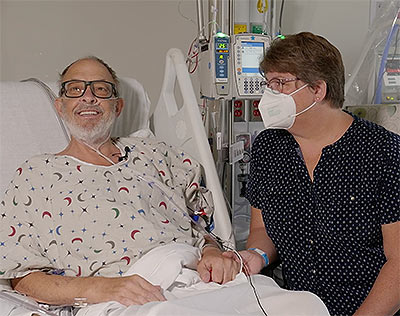UM Medicine Performs Second Historic Pig Heart Transplant
September 27, 2023 Deborah Kotz
The patient is a 58-year-old man from Frederick, Md., with terminal heart disease. Both historic surgeries were performed by School of Medicine faculty at the University of Maryland Medical Center.
Photo: Lawrence and Ann Faucette
A 58-year-old patient with terminal heart disease became the second patient in the world to receive a historic transplant of a genetically modified pig heart on Sept. 20.
He is recovering and communicating with his loved ones. This is only the second time in the world that a genetically modified pig heart has been transplanted into a living patient. Both historic surgeries were performed by University of Maryland School of Medicine (UMSOM) faculty at the University of Maryland Medical Center (UMMC).
The first historic surgery, performed in January 2022, was conducted on David Bennett by University of Maryland Medicine surgeons (comprising UMSOM and UMMC), who are recognized as the leaders in cardiac xenotransplantation. This new patient, Lawrence Faucette, had end-stage heart disease. He was deemed ineligible for a traditional transplant with a human heart, by UMMC and several other leading transplant hospitals, due to his pre-existing peripheral vascular disease and complications with internal bleeding.
This transplant was the only option available for Faucette, who was facing near-certain death from heart failure. The patient, who lives in Frederick, Md., is a married father of two and a 20-year Navy veteran and most recently worked as a lab technician at the National Institutes of Health before his retirement. He is currently breathing on his own, and his heart is functioning well without any assistance from supportive devices.
“My only real hope left is to go with the pig heart, the xenotransplant,” Faucette said during an interview from his hospital room a few days before his surgery. “Dr. Griffith, Dr. Mohiuddin, and their entire staff have been incredible, but nobody knows from this point forward. At least now I have hope, and I have a chance."
Added his wife, Ann Faucette: “We have no expectations other than hoping for more time together. That could be as simple as sitting on the front porch and having coffee together."
The U.S. Food and Drug Administration granted emergency approval for the surgery on Friday, Sept. 15, through its single patient investigational new drug (IND) “compassionate use” pathway. This approval process is used when an experimental medical product, in this case the genetically modified pig’s heart, is the only option available for a patient faced with a serious or life-threatening medical condition. The approval was granted in the hope of saving the patient’s life.
“We are once again offering a dying patient a shot at a longer life, and we are incredibly grateful to Mr. Faucette for his bravery and willingness to help advance our knowledge of this field,” said Bartley P. Griffith, MD, who surgically transplanted the pig heart into both the first and second patient at UMMC. Griffith is the Thomas E. and Alice Marie Hales Distinguished Professor in Transplant Surgery and clinical director of the Cardiac Xenotransplantation Program at UMSOM. “We are hopeful that he will get home soon to enjoy more time with his wife and the rest of his loving family.”
Considered one of the world’s foremost experts on xenotransplantation, Muhammad M. Mohiuddin, MD, professor of surgery at UMSOM, joined the UMSOM faculty seven years ago and established the Cardiac Xenotransplantation Program. Mohiuddin serves as its program/scientific director and co-led this procedure with Griffith.
“We are continuing to pursue the pathway to clinical trials by providing important new data on preclinical research that has been requested by the FDA,” Mohiuddin said. “The FDA used our data from these new studies, as well as our experience with the first patient, to determine that we were ready to attempt a second transplant in an end-stage heart disease patient who had no other treatment options.”
About 110,000 Americans are currently waiting for an organ transplant, and more than 6,000 patients die each year before getting one, according to the federal government’s organdonor.gov. Transplanting animal organs (known as xenotransplantation) could potentially save thousands of lives but carries a unique set of risks. Besides the fear of transmitting an unknown pathogen from the animal to human, xenotransplants are more likely to trigger a dangerous immune response. These responses can trigger an immediate rejection of the organ with a potentially deadly outcome to the patient.
“As a cardiothoracic surgeon who does lung transplants, I am so grateful to our team of surgeons who are working to help solve the organ shortage crisis,” said Christine Lau, MD, MBA, the Dr. Robert W. Buxton Professor and Chair of the Department of Surgery at UMSOM and surgeon-in-chief at UMMC. “Once again, we are at the forefront of a historic accomplishment that brings us one step closer to making xenotransplantation a lifesaving reality for patients in need.”